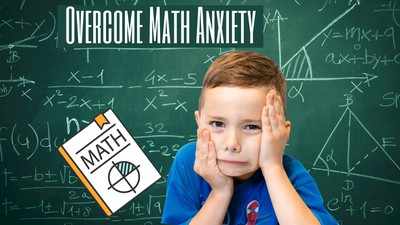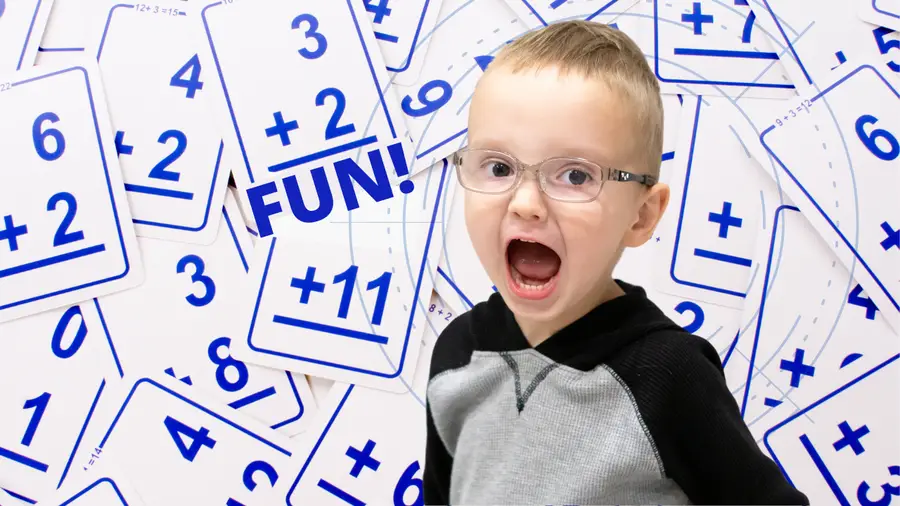Two things about math in American education are true. First, the ‘M’ in STEM, math has never been made to seem so important to our students. Second, the way math is taught can sometimes seem challenging and, well, not very fun.
Understanding why your child or student (or yourself) is struggling with math will be the first step to helping overcome math anxiety, and there are steps you can take to create positive associations with math to encourage them as they learn.

What is Math Anxiety?
I used to like math. As a child, it made sense. Counting was easy and numbers were absolute. When I was first learning algebra, felt a sense of accomplishment solving an equation.
Somewhere along the way, that changed. I can’t pinpoint the moment of the shift, but somewhere along the way things got complex. The way math concepts were presented was dry and difficult. It became a chore. I learned to hate math. More than that, I learned to avoid it. For many years, I side stepped paths that would be heavy on math. It affected jobs I took. It affected career paths.
“Math is the killer,”
Bill Gates
“Math is the killer,” Bill gates stated in an interview with Wired magazine. Gate’s foundation conducted an unemployment study and found math seemed to be a common impediment: “If you ask people, ‘Hey, there are these open nursing jobs, why don’t you go and get one?’ math is often the reason they give for not applying,” Gates says. “‘Why didn’t you pass the police exam?’ Math.”
Math anxiety stars early. Statistics show over half of 1st and 2nd graders have math anxiety linked to low performance. It can grow into a life long aversion – or outright fear and avoidance – of math.
According to an article from the US National Library of Medicine, “Math anxiety is a widespread, worldwide problem affecting all age groups. Approximately 93% of adult US-Americans indicate that they experience some level of math anxiety.” Wow. A whopping 93%. That’s most of us. So math anxiety is definitely a thing. And math anxiety is perfectly normal.
Take a breath and read on to understand why your child or student – or you yourself – might be suffering anxiety and learn how to recognize math anxiety.
How To Recognize Math Anxiety
Math anxiety might manifest in primary or secondary school, and different students will experience different things because of their anxiety surrounding math.
- Passivity or boredom when it’s time to do math homework is a good sign of math anxiety. Your student might feign boredom to conceal their anxiety or fear of failure.
- Avoidance of math homework is another common sign. Some students would rather not attempt to take math tests, study, or do homework than try and fail.
- Lack of confidence regarding math. Your student might feel that she will always be bad at math because she hasn’t had success in the past.
- Panic during homework or tests is a telling sign of math anxiety. If your students act out in response to math homework, start a conversation about why they feel they can’t succeed at math.
Now that we can spot some of the signs of math anxiety, what can we do about it?
Overcoming Math Anxiety
Math anxiety is the product of a combination of pressures and experiences and, while there are steps one can take to help overcome math anxiety, you can also ensure that your kids grow up with a healthy relationship with math. Starting conversations about where the bad vibes about math are come from is crucial.
Parents are accustomed to creating positive experiences around reading, but math does not get the same love. There isn’t a math equivalent to “storytime.” Math is another language of symbols we use to communicate ideas but kids don’t acquire the ability to read and speak math in quite the same way.
Create Positive Associations With Math
The best way to ensure that your young students don’t develop math anxiety is to create positive experiences and associations with math with kids from a young age. Just as parents introduce letter-sound recognition, they can introduce and reinforce basic math skills.
“A positive attitude toward math boosts the brain’s memory center and predicts math performance independent of factors such as a child’s IQ, a Stanford study has found.”
Stanford.edu
Find opportunities to create positive experiences with math, including basic addition and subtraction. When your kids begin to learn math in school, don’t shame them if they fail. Find ways to create opportunities from failures and practice skills with students at home. Make math fun!
Math storybooks are a great way to introduce math concepts, especially for younger kids. The focus here is on the story, the pictures, and characters, not so much the math. Stories provide another way to reach kids that may not want to take on math directly, even though they’re learning math along the way. Check out our favorite math storybooks for some ideas.
Gamify Math
What’s one of the easiest way’s to get through a boring or difficult task? Make a game out of it.
We do simple things with treats. “If you have 3 red gummy bears, and I give you 2 green ones, how many gummy bears do you have?” or “If you have 5 gummy bears and eat one, how many gummy bears do you have left?” Use cookies, cheerios, baby carrots, or whatever your child likes to eat to teach basic addition, subtraction, and counting.
We’ll use a set of dice to do some basic addition and subtraction and let them count the dots we’re adding or taking away.
You can also find interactive games online. For example, Prodigy is a popular game that teaches math skills. There are elements of Pokemon and Minecraft as kids explore and battle monsters. Kids complete a baseline placement test, and the game can provide challenges to level up their math skill as they level up in the game. Kids can play for free, though you’ll need a subscription for some features.
There a plenty of other games available. Youcubed has a list of some cool apps and games to get started as well.
Bring Math into Everyday Conversation
We’re surrounded by math in everyday life. We do math constantly, subconsciously, even if we don’t realize it.
Use simple everyday questions with your kids:
- If we’re making everyone a sandwich, how many slices of bread do we need?
- How much gas is in the car and will do you think we need to fill up before we get there?
- How many more floors until we get off the elevator?
- How can we cut the pizza so everyone gets a slice?
- How many dimes are equal to a dollar? What about quarters? Nickels? Pennies?
Math will tell us the answers, and get them thinking about the solutions. “When will I use math in real life?” is a common question when kids are learning math. All. The. Time.
Related Posts: For some ideas on how to break down barriers to math, check out How to Make Math Fun for Kids and Teaching Algebra with STEM Activities

Hire a Tutor
Sometimes, your child’s math teacher, the testing environment, or other elements you don’t have control over as a parent are the source of the math anxiety. A tutor can help reinforce the skills that they are learning in the classroom, while providing a different environment.
Tutors, both online and in-person, are trained to help students overcome shame and anxiety surrounding the subject; shame and anxiety are often the reason that parents and students turn to tutors for extra help.
Have a conversation with the tutor about the specific anxieties or issues your child is experiencing and have them focus on creating positive associations for skills with which they are struggling.
Need some extra math practice? We’ve got some fun themed math worksheets in our printables shop. Check out the holiday themed worksheets, or grab some fun characters like dinosaurs or astronauts!
What Causes Math Anxiety?
It would be an oversimplification to pinpoint once source or cause for student’s math anxiety when anxiety of any kind is caused by a host of factors. Let’s take a second to think about how students acquire knowledge and why there would be anxiety associated with learning new skills like math.
As mentioned above, American parents are less likely to find opportunities to create positive associations with math than they are with language, reading, and writing. Literacy is considered an essential skill and parents are diligent about helping their children to acquire literacy.
The word “acquire” is important here. Children aren’t taught language so much as they acquire it from their surroundings, from parents and siblings and family and anyone who is communicating with language around them.
Lots of parents also go out of their way to read to children and most create positive experiences, with rewards of attention or food, when a child shows development in language acquisition.
When students enter kindergarten and first grade and begin to learn basic skills with math, they are introduced to an entirely new set of symbols that constitutes a mode of communication that will get increasingly complex over the course of primary and secondary education.
This lack of positive associations is coupled with the high-pressure situations that schools and teachers create surrounding math. Math tests are often given with strict time limits (pencils down!) and, without a solid and ongoing foundation of positive associations with math, students can begin to feel alone and afraid of embarrassment if they fail.
Working Memory and Anxiety
As students progress through school, the increasingly complex series of equations to remember and steps to follow requires more working memory. Working memory helps people to remember and follow a sequence of events to get to a given result and working with lots of numbers and symbols puts increased stress on the working memory.
The working memory becomes harder to access when people become anxious. The mind is occupied with fears of failure and embarrassment and distracted from the task at hand. Being asked to memorize and reproduce the Pythagorean theorem becomes more difficult as anxiety levels increases.
Some students don’t experience math anxiety until middle school or high school because of this, while others will struggle with long division and two-column multiplication. Creating an environment of positive reinforcement and reframing failure as an opportunity is important to help students of any age who are suffering from math anxiety.
It is important, also, to talk to students about their experiences and to help them to not feel ashamed of their shortcomings. Read for good ways to approach conversations about math anxiety with your kids.
How To Talk To Kids About Math Anxiety
Any of these situations presents parents with an opportunity to talk with their children about learning math and to begin to create positive associations surrounding math. As mentioned above, creating positive experiences and associations with math is vital for encouraging students’ progress.
- Failure is okay. Failure is an opportunity for growth. If you remind your student of this consistently, you can help them to overcome any anxiety surrounding the fear of failure in math or other subjects.
Related Post: We talk about how to accept and move past failure as well as a few kid friendly books on the topic. Find out some Simple Steps to Move Past Failure
- Math IS HARD. It is complex and often difficult. Concepts and formulas can be difficult to remember and having honest conversations with your kids about that fact is key.
- Math is for everyone. There is a myth that only some people are good at math and that others are just not good at math. Remind your kids that anyone can be good at math with enough practice.
I’ll admit I hated math by the time I got to high school, and avoided some classes – and career choices – because of it. When I finally got around to college, math was unavoidable. Accepting I’d have to learn it to graduate, I buckled down and did the work. At a professor’s recommendation (and prodding), I soon wound up working a few semesters as a math tutor and helping other students work through their own math “problems.” - Praise hard work, not just successes. A vital part of creating positive and supportive experiences surrounding math is recognizing that your child is working hard even if they are still struggling. (This is not just a math lesson – this one is a life lesson!)
- Do math together, especially with younger kids. If your kids see that you are happy to be doing math, they will be too.
Math Education Collaborative has a great list of questions to help your child make sense of homework and math:- What is the problem about? Tell me in your own words.
- What did you do in class to get started?
- Can you make a diagram or draw a sketch?
- What assumptions are you making?
- How do you know you are solving the right problem?
- Could there be any missing or extra information?
- Can you solve a simpler version of the problem?
- What have you already tried? What steps did you take?
- Can you tell me what you know so far?
- What is the important information you need to solve the problem?
- Did you check your arithmetic?
- Can we break the problem down?
- Do you notice a pattern?
- Thinking verbally can be an excellent tool to reinforce any skill. Have your child teach you the skills with math they are learning to help them understand the skills they are working to build. Don’t be afraid to ask questions and remember to praise progress.
- Teach through stories: Help your kids verbally with some books on the topic. This can help kids learn to like math (or at least not be afraid of math), especially at an early age. Check out some of our favorite books about math for preschool age kids.
“It’s important for children to have a real understanding of mathematics before they enter kindergarten. With more children excelling at math, it will reduce the stress and anxiety they have about the subject, and in the future, we will begin to see a decline in the number of people leaving the STEM field”
Dr. Aditya Nagrath, Mathematician and Founder of Elephant Learning
Wrap Up – How To Overcome Math Anxiety
Math is perfect fodder for the classic stress dream; showing up late for the math test, the ticking of the clock bearing down on you as your pencil breaks, and oh yeah – you forgot your pants. We’ve all been there.
Math anxiety is normal, and most people wrestle with it to some degree. Once we realize it and recognize it, we can work to move past math anxiety.
Math doesn’t have to be scary, and we don’t have to be afraid of math. We can unlearn our fear of math with some effort. Though we can learn to overcome math anxiety, it’s easier to avoid it in the first place.
Math and I have had a hit and miss relationship over the years. I’m hoping I can teach my kids to do better. I’m hoping you can do the same.

